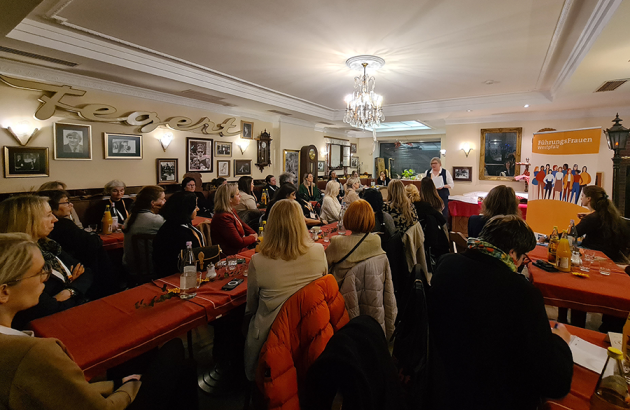Intercultural competence and communication was the topic of the 8th network meeting of the FührungsFrauen Westpfalz, organised as always by the ZukunftsRegion Westpfalz (ZRW) association and the IHK Pfalz. This time, the venue chosen for the meeting was Café Krummel by Fegert in Mühlstraße in Kaiserslautern, a café with a long tradition. In a relaxed atmosphere, the participants were offered an exciting topic with keynote speeches, experience reports and lively discussions.
What is meant by the term intercultural competence? Basically, it means the ability to communicate respectfully and effectively with people from other cultures, to be aware of the differences between cultures and to respect them, said Jutta Metzler, ZRW board member and IHK Vice President, at the start of the event.
Michaela Weber, trainer, coach and speaker for intercultural communication and competence, knows how quickly misunderstandings can arise between people with different intercultural backgrounds. Whether in a professional or private context, cultural differences harbour potential for conflict, both in verbal and non-verbal communication.
But why is that? ‘Different countries, different customs’ would be the right approach, but it's not the whole truth. For example, the definition of ‘tomorrow’ is different in Germany than in Spain or a nod of the head means ‘no’ in other cultures. What is completely normal and polite for one person may be perceived as disrespectful by another.
The image of the invisible rucksack that we carry and feel but cannot see fits in with this - and it is the same with our counterparts. Then there are the factors that shape us: everything that surrounds us, be it parents, friends, colleagues and, in general, the environment in which we grow up. We should also be aware of the following: In an intercultural context, behaviours are not to be judged as right or wrong, but as ‘different’. And even if there is often some truth in typical national stereotypes, we should not be guided solely by them. There are also prejudices against Germans, for example with regard to punctuality, straightforwardness and bureaucracy. In some cultures, these qualities are perceived as disrespectful, while in others they are seen as very positive.
This was confirmed by the reports from other participants that afternoon. Two women with a different cultural background had their say. Both women have been living in Germany for over 20 years and come from the Côte d'Ivore (Ivory Coast/West Africa). Annick Pommer's report was characterised by predominantly positive experiences. For example, she considers punctuality to be an important quality and sees it as respectful behaviour.
Unfortunately, the reverse can also be the case, as we learnt from another participant. We were confronted with experiences that left us speechless. She was obviously treated in a very discriminatory way because of her origin and skin colour. However, like Annick Pommer, she has successfully made her way thanks to good self-confidence and self-awareness as well as positive encounters.
To conclude, Jutta Metzler once again emphasised the most important values in mutual interaction. Namely: acceptance, tolerance, respect and impartiality. These values should always be observed when interacting with people, whether at work or in private life.
As always, the event was followed by networking and dialogue over a light snack.



